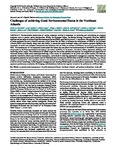Challenges of achieving Good Environmental Status in the Northeast Atlantic
| dc.contributor.author | Alexander, KA | |
| dc.contributor.author | Kershaw, P | |
| dc.contributor.author | Cooper, P | |
| dc.contributor.author | Gilbert, AJ | |
| dc.contributor.author | Hall-Spencer, Jason | |
| dc.contributor.author | Heymans, JJ | |
| dc.contributor.author | Kannen, A | |
| dc.contributor.author | Los, HJ | |
| dc.contributor.author | O'Higgins, T | |
| dc.contributor.author | O'Mahony, C | |
| dc.contributor.author | Tett, P | |
| dc.contributor.author | Troost, TA | |
| dc.contributor.author | van Beusekom, J | |
| dc.date.accessioned | 2015-12-09T16:26:57Z | |
| dc.date.available | 2015-12-09T16:26:57Z | |
| dc.date.issued | 2015 | |
| dc.identifier.issn | 1708-3087 | |
| dc.identifier.issn | 1708-3087 | |
| dc.identifier.other | art49 | |
| dc.identifier.uri | http://hdl.handle.net/10026.1/3900 | |
| dc.description.abstract |
The sustainable exploitation of marine ecosystem services is dependent on achieving and maintaining an adequate ecosystem state to prevent undue deterioration. Within the European Union, the Marine Strategy Framework Directive (MSFD) requires member states to achieve Good Environmental Status (GEnS), specified in terms of 11 descriptors. We analyzed the complexity of social-ecological factors to identify common critical issues that are likely to influence the achievement of GEnS in the Northeast Atlantic (NEA) more broadly, using three case studies. A conceptual model developed using a soft systems approach highlights the complexity of social and ecological phenomena that influence, and are likely to continue to influence, the state of ecosystems in the NEA. The development of the conceptual model raised four issues that complicate the implementation of the MSFD, the majority of which arose in the Pressures and State sections of the model: variability in the system, cumulative effects, ecosystem resilience, and conflicting policy targets. The achievement of GEnS targets for the marine environment requires the recognition and negotiation of trade-offs across a broad policy landscape involving a wide variety of stakeholders in the public and private sectors. Furthermore, potential cumulative effects may introduce uncertainty, particularly in selecting appropriate management measures. There also are endogenous pressures that society cannot control. This uncertainty is even more obvious when variability within the system, e.g., climate change, is accounted for. Also, questions related to the resilience of the affected ecosystem to specific pressures must be raised, despite a lack of current knowledge. Achieving good management and reaching GEnS require multidisciplinary assessments. The soft systems approach provides one mechanism for bringing multidisciplinary information together to look at the problems in a different light. | |
| dc.language | en | |
| dc.language.iso | en | |
| dc.publisher | Resilience Alliance, Inc. | |
| dc.subject | ecosystem-based management | |
| dc.subject | Good Environmental Status | |
| dc.subject | Northeast Atlantic | |
| dc.subject | soft systems methodology | |
| dc.subject | trade-offs | |
| dc.title | Challenges of achieving Good Environmental Status in the Northeast Atlantic | |
| dc.type | journal-article | |
| dc.type | Journal Article | |
| plymouth.author-url | https://www.webofscience.com/api/gateway?GWVersion=2&SrcApp=PARTNER_APP&SrcAuth=LinksAMR&KeyUT=WOS:000353293900064&DestLinkType=FullRecord&DestApp=ALL_WOS&UsrCustomerID=11bb513d99f797142bcfeffcc58ea008 | |
| plymouth.issue | 1 | |
| plymouth.volume | 20 | |
| plymouth.publication-status | Published online | |
| plymouth.journal | Ecology and Society | |
| dc.identifier.doi | 10.5751/es-07394-200149 | |
| plymouth.organisational-group | /Plymouth | |
| plymouth.organisational-group | /Plymouth/Faculty of Science and Engineering | |
| plymouth.organisational-group | /Plymouth/Faculty of Science and Engineering/School of Biological and Marine Sciences | |
| plymouth.organisational-group | /Plymouth/PRIMaRE Publications | |
| plymouth.organisational-group | /Plymouth/REF 2021 Researchers by UoA | |
| plymouth.organisational-group | /Plymouth/REF 2021 Researchers by UoA/UoA07 Earth Systems and Environmental Sciences | |
| plymouth.organisational-group | /Plymouth/Research Groups | |
| plymouth.organisational-group | /Plymouth/Research Groups/Marine Institute | |
| plymouth.organisational-group | /Plymouth/Users by role | |
| plymouth.organisational-group | /Plymouth/Users by role/Academics | |
| dc.identifier.eissn | 1708-3087 | |
| dc.rights.embargoperiod | Not known | |
| rioxxterms.versionofrecord | 10.5751/es-07394-200149 | |
| rioxxterms.licenseref.uri | http://www.rioxx.net/licenses/all-rights-reserved | |
| rioxxterms.type | Journal Article/Review |


